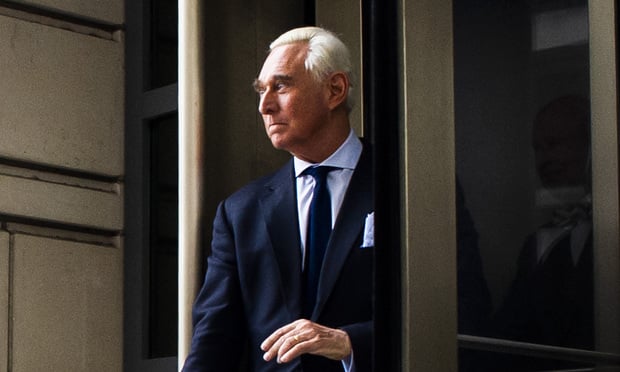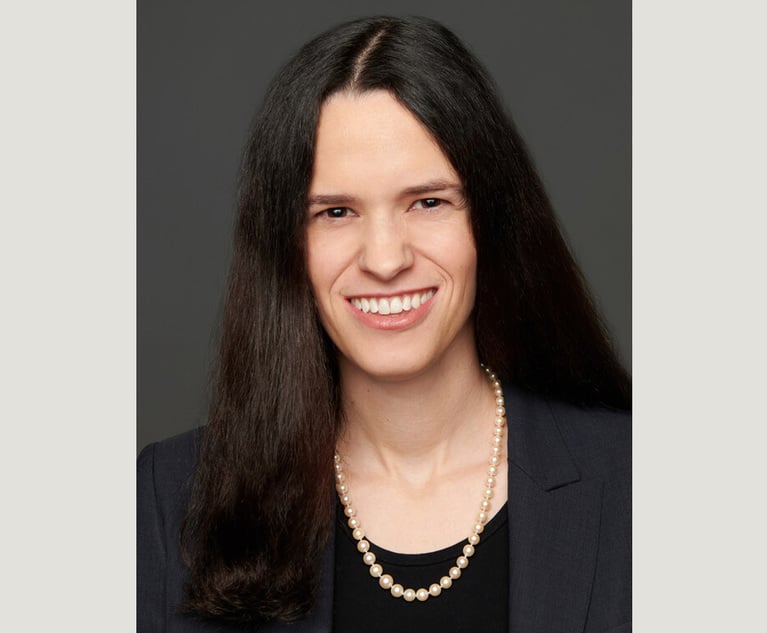Roger Stone Jurors, Citing Trump Tweets, Say They've Been Threatened and Fear Harassment
"It is intimidating when the President of the United States attacks the foreperson of a jury by name," one juror said.
April 16, 2020 at 11:57 AM
6 minute read
 Former Trump adviser Roger Stone, indicted by the team of Special Counsel Robert Mueller, departs Federal Court after attending his arraignment hearing, where he pleaded not guilty, in Washington, D.C., on Jan. 29, 2019.
Former Trump adviser Roger Stone, indicted by the team of Special Counsel Robert Mueller, departs Federal Court after attending his arraignment hearing, where he pleaded not guilty, in Washington, D.C., on Jan. 29, 2019.
Roger Stone's jurors are speaking out in court against the potential release of their questionnaires, saying they fear harassment after attacks by President Donald Trump on the jury's foreperson.
Right-wing figure Mike Cernovich, represented by Connecticut lawyer Norm Pattis, in February petitioned for the release of the forms amid Stone's bid for a new trial. U.S. District Judge Amy Berman Jackson of the District of Columbia—who presided over Stone's trial—tapped Sidley Austin partner Alan Raul to represent any jurors who wanted to get involved in the case, and on Wednesday Raul filed a motion on their behalf opposing the release of the questionnaires.
The filing, citing remarks made by figures from Trump to InfoWars host and conspiracy theorist Alex Jones, says "the threats to the jurors' safety and privacy persist" since the trial's conclusion in November.
"Indeed, the record shows that the jurors have been subject to continued harassment since the trial concluded and that the release of the questionnaires would only exacerbate the significant risks the jurors face," the filing reads. "On the special facts present here, it is necessary—indeed essential—for the jurors' protections to remain in place. Otherwise, the balancing required by the Supreme Court to protect jury privacy is no better than lip service."
Included in the filing are declarations from each of the jurors who convicted Stone in November on charges of lying to Congress, impeding the House Intelligence Committee's Russia probe and witness tampering.
In the declarations, the jurors describe how they were told the questionnaires they filled out would remain confidential. That meant they included information that could be used to easily identify them and their family members.
"These declarations describe risks not only to their own personal safety, but also to the safety of their family members—many of whom can be easily identified based on information disclosed in their questionnaires," the document states. "Jurors—including some who are federal employees, and work with or are supervised by political appointees, or who work for organizations that depend on federal funding—also have justifiable fears that online harassment would threaten their employment and hard-earned professional reputations."
Stone's trial found itself at the center of a media and political melee earlier this year, over the federal government's recommendation for his sentence. The four prosecutors who secured Stone's conviction initially told Jackson she should sentence him to up to nine years.
But after intervention from Main Justice, which said that sentence was too tough, all of the D.C. prosecutors withdrew from the case and one resigned from DOJ entirely. Jackson in February sentenced Stone to 40 months in prison.
In response to that controversy, the foreperson of Stone's jury spoke out in support of the prosecutors. But prior social media posts she made were uncovered as a result, spurring claims from conservatives, including Trump, that she was biased against Stone and may have made false statements in her questionnaire.
Stone's attorneys filed a motion for a new trial, and Jackson held a hearing on the motion in late February. During the hearing, she called two members of the jury to the stand to testify about the conduct of the foreperson, as well as the foreperson to discuss the social media posts.
Jackson indicated throughout those proceedings that the safety of the jurors was paramount, and sealed the courtroom itself during the hearing. Audio of the hearing was streamed to the media room in the D.C. federal courthouse.
In the declarations filed Wednesday, the jurors said Jackson and her courtroom deputy committed to protecting their privacy if they wished, including keeping the questionnaires sealed. They said they were allowed to speak publicly if they wanted, but the vast majority of them did not want to do so.
"Given the current climate of polarization and harassment, I do not want to draw any attention to myself, my family, or my employer in any way, shape, or form. It is intimidating when the President of the United States attacks the foreperson of a jury by name," one juror wrote.
Several jurors said that while they took their civil service seriously, the experience has since soured.
"I served willingly, but I did not sign up for what it has become. I find the current situation disheartening," one juror said.
The jury's foreperson wrote that she has experienced "significant harassment" since she spoke out publicly, and "received a dizzying volume of messages on my social media accounts, email, and even home address."
"I have been named and attacked by the President of the United States on Twitter, as well as by certain news hosts and many others," she wrote.
Another juror who has spoken publicly wrote in his declaration that he too has been harassed. He said he received a handwritten postcard at his home about the trial, which he said is "an implied threat, indicating that the sender knows where I live."
Jackson has yet to rule on Stone's motion for a new trial, which means he has not had to report to federal prison to serve his 40-month sentence.
Read more:
Trump Tweets, Hidden Jurors and 'Public Enemy' Lyrics: Roger Stone's Bid for a New Trial Marches On
At Roger Stone's Sentencing, an Apology From the Justice Department
This content has been archived. It is available through our partners, LexisNexis® and Bloomberg Law.
To view this content, please continue to their sites.
Not a Lexis Subscriber?
Subscribe Now
Not a Bloomberg Law Subscriber?
Subscribe Now
NOT FOR REPRINT
© 2025 ALM Global, LLC, All Rights Reserved. Request academic re-use from www.copyright.com. All other uses, submit a request to [email protected]. For more information visit Asset & Logo Licensing.
You Might Like
View All

In-House Moves of the Month: Boeing Loses Another Lawyer, HubSpot Legal Chief Out After 2 Years
5 minute read
After Regime Change, Syria Remains Liable in US Federal Courts for Alleged Assad-Era Terrorism Support
3 minute read
Law Firms Mentioned
Trending Stories
- 1Uber Files RICO Suit Against Plaintiff-Side Firms Alleging Fraudulent Injury Claims
- 2The Law Firm Disrupted: Scrutinizing the Elephant More Than the Mouse
- 3Inherent Diminished Value Damages Unavailable to 3rd-Party Claimants, Court Says
- 4Pa. Defense Firm Sued by Client Over Ex-Eagles Player's $43.5M Med Mal Win
- 5Losses Mount at Morris Manning, but Departing Ex-Chair Stays Bullish About His Old Firm's Future
Who Got The Work
J. Brugh Lower of Gibbons has entered an appearance for industrial equipment supplier Devco Corporation in a pending trademark infringement lawsuit. The suit, accusing the defendant of selling knock-off Graco products, was filed Dec. 18 in New Jersey District Court by Rivkin Radler on behalf of Graco Inc. and Graco Minnesota. The case, assigned to U.S. District Judge Zahid N. Quraishi, is 3:24-cv-11294, Graco Inc. et al v. Devco Corporation.
Who Got The Work
Rebecca Maller-Stein and Kent A. Yalowitz of Arnold & Porter Kaye Scholer have entered their appearances for Hanaco Venture Capital and its executives, Lior Prosor and David Frankel, in a pending securities lawsuit. The action, filed on Dec. 24 in New York Southern District Court by Zell, Aron & Co. on behalf of Goldeneye Advisors, accuses the defendants of negligently and fraudulently managing the plaintiff's $1 million investment. The case, assigned to U.S. District Judge Vernon S. Broderick, is 1:24-cv-09918, Goldeneye Advisors, LLC v. Hanaco Venture Capital, Ltd. et al.
Who Got The Work
Attorneys from A&O Shearman has stepped in as defense counsel for Toronto-Dominion Bank and other defendants in a pending securities class action. The suit, filed Dec. 11 in New York Southern District Court by Bleichmar Fonti & Auld, accuses the defendants of concealing the bank's 'pervasive' deficiencies in regards to its compliance with the Bank Secrecy Act and the quality of its anti-money laundering controls. The case, assigned to U.S. District Judge Arun Subramanian, is 1:24-cv-09445, Gonzalez v. The Toronto-Dominion Bank et al.
Who Got The Work
Crown Castle International, a Pennsylvania company providing shared communications infrastructure, has turned to Luke D. Wolf of Gordon Rees Scully Mansukhani to fend off a pending breach-of-contract lawsuit. The court action, filed Nov. 25 in Michigan Eastern District Court by Hooper Hathaway PC on behalf of The Town Residences LLC, accuses Crown Castle of failing to transfer approximately $30,000 in utility payments from T-Mobile in breach of a roof-top lease and assignment agreement. The case, assigned to U.S. District Judge Susan K. Declercq, is 2:24-cv-13131, The Town Residences LLC v. T-Mobile US, Inc. et al.
Who Got The Work
Wilfred P. Coronato and Daniel M. Schwartz of McCarter & English have stepped in as defense counsel to Electrolux Home Products Inc. in a pending product liability lawsuit. The court action, filed Nov. 26 in New York Eastern District Court by Poulos Lopiccolo PC and Nagel Rice LLP on behalf of David Stern, alleges that the defendant's refrigerators’ drawers and shelving repeatedly break and fall apart within months after purchase. The case, assigned to U.S. District Judge Joan M. Azrack, is 2:24-cv-08204, Stern v. Electrolux Home Products, Inc.
Featured Firms
Law Offices of Gary Martin Hays & Associates, P.C.
(470) 294-1674
Law Offices of Mark E. Salomone
(857) 444-6468
Smith & Hassler
(713) 739-1250








